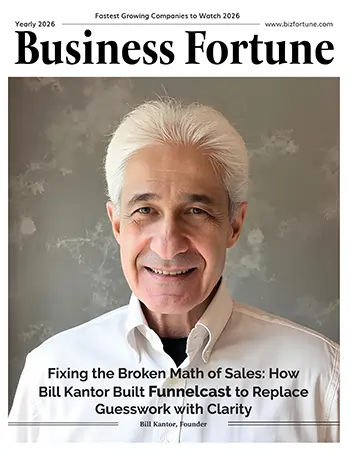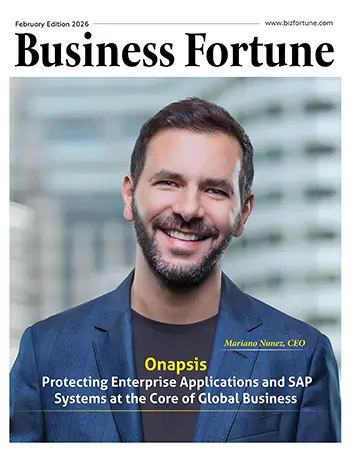-Ava Thompson
There are restaurants that feed people.

And then there are restaurants that move them.
The kind that make your chest tighten when a smell hits memory instead of just your tongue. When a quiet jazz riff feels like something you heard once, long ago.
Kostiantyn Lytvynenko builds the second kind. And he’s doing it far from home.
Born and raised in Ukraine, Lytvynenko grew up around food, family, and the quiet rituals that turn kitchens into something sacred. By the time he left Kyiv, he had already made a name for himself — and not through hype, but through hard-earned respect. His restaurant Mamoy Klyanus was grilled by “Revizor,” Ukraine’s most infamous restaurant inspection show.
“They tore us apart,” he laughs. “But we passed. Barely.”
His next project, Plov Khochu, turned into a cult sensation and landed him in the SALT Awards three years in a row. Some people called it “ethnic.” He just called it home.
But even with national recognition, something was missing.
“I knew I had to leave,” he says. “Not because Ukraine wasn’t enough. But because I wanted to build something that could stand on its own — in a place where no one knew my name.”
From Kyiv to Miami: Designing Emotion
Lytvynenko arrived in the U.S. with no investors, no safety net, and a vision very few understood.
“Everyone told me to do a food truck,” he recalls. “I said no. I’m not selling convenience. I’m selling feeling.”
That belief gave birth to All You Need in Miami — a breakfast spot filled with sun-drenched spices, soft architectural curves, and a Mediterranean rhythm. It wasn’t just a brunch place; it was an experience. Within two months, the restaurant turned a profit and was later sold as a high-performing business.
But the philosophy remained:
“This isn’t fusion,” he says. “It’s a conversation. Between who I am and where you are.”
Los Angeles: Conviction, Patience, and Detail
His next chapter took him to Los Angeles. He found a promising location online — but the reality was far from ideal. No foot traffic. No vibe. Still, he believed in the vision.
But the biggest challenge wasn’t financial.
“The hardest part was convincing the landlords to give us the space,” he says. “We had to make them believe in us, in what we were building. And we did.”
From there, every detail mattered.
“I didn’t literally sleep on site,” he jokes, “but mentally I never left the space. I was there all day, every day — inside the lighting, the layout, the way it would make someone feel before they even sat down.”
That process became Mood — a sleek, intimate, tropical-inspired breakfast restaurant on West 3rd Street.
It doesn’t announce itself.
It flows — through the light, the color, the stillness. Through the handmade ceramic bowls and the vinyl spinning jazz in the background.
And yes — through the food.
He didn’t try to “represent” Ukraine on the plate.
He quietly infused its soul into modern dishes.
Elements of Middle Eastern comfort — like velvety hummus with a citrus twist — appear where you wouldn’t expect them: spread under avocado toast, folded into breakfast bowls, served alongside heirloom tomatoes and poached eggs.
It’s not about geography. It’s about feeling.
A sense of warmth, generosity, and memory — hidden in dishes that speak the language of the present.
“The first emotion is more important than the first bite,” he says.
Why It Works: Story Over Strategy
What sets Lytvynenko apart is something many restaurateurs overlook — memory. He’s not chasing TikTok trends or Google keywords. He’s chasing what people remember. Not what they tasted, but how they felt.
In Miami, the lighting shifted every hour — not to mimic the sun, but to follow the emotional arc of a guest’s visit.
In L.A., the scent at the door changes nightly — sometimes herbal, sometimes warm spice, sometimes barely there.
“One guest walked in and said it smelled like vacation,” he recalls. “Not a place — a state of mind. They felt like they could exhale.”
His team tracks the invisible: where people pause, what song makes them linger, which dish gets posted, and which gets eaten in reverent silence.
“Silence is gold,” he grins. “It means we hit something deeper.”
This is emotional architecture, not marketing.
He doesn’t build for impressions. He builds for imprints.
Most guests couldn’t tell you exactly what they ate. But they’ll tell you how the room felt when the lights dimmed. How the server looked them in the eye, like they mattered.
They come back for that.
For something they didn’t expect to care about — but suddenly do.
At a time when restaurants chase algorithms, Lytvynenko is chasing something slower — and far more lasting.
“People don’t want more options,” he says. “They want to feel chosen.”
The Future: Not More, But Deeper
Lytvynenko’s next concept won’t have a printed menu. The server will tell a story instead.
“You don’t really order food here,” he shrugs. “It’s more like… choosing a feeling you didn’t know you missed.”
In his next space, the lighting will fade like a memory.
Scents will shift subtly throughout the day — never enough to name, just enough to notice when they’re gone.
He’s also experimenting with seasonal menus based not on the weather, but on emotional seasons:
a dish that reminds you of your childhood,
your first solo trip,
or something your body forgot but your soul still remembers.
What he’s building isn’t a chain.
It’s not even a concept.
It’s a feeling — protected, refined, and offered without translation.
Most places use culture like wallpaper — decorative, flat, replaceable.
Lytvynenko doesn’t decorate with culture. He builds from it.
You taste it in the bitterness of a spice, or the quiet moment before dessert.
It’s not always obvious.
But it’s always there.
Because people don’t come back for a meal.
They come back for how it made them feel.



































